Unit 4 Having fun Topic 2 第4课时 课件(仁爱科普版七年级上册)
文档属性
| 名称 | Unit 4 Having fun Topic 2 第4课时 课件(仁爱科普版七年级上册) |

|
|
| 格式 | ppt | ||
| 文件大小 | 932.5KB | ||
| 资源类型 | 试卷 | ||
| 版本资源 | 仁爱科普版 | ||
| 科目 | 英语 | ||
| 更新时间 | 2023-07-24 00:00:00 | ||
图片预览

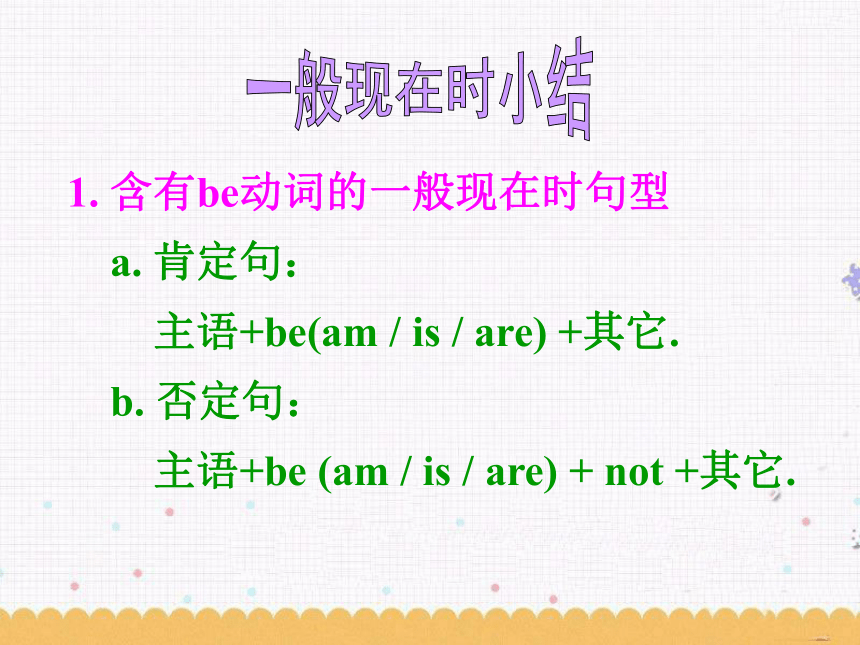
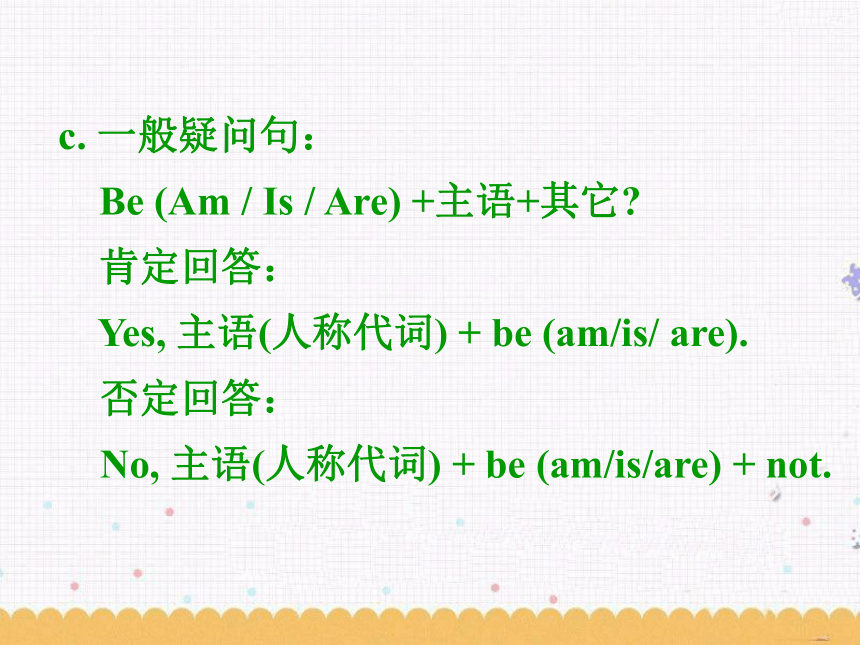
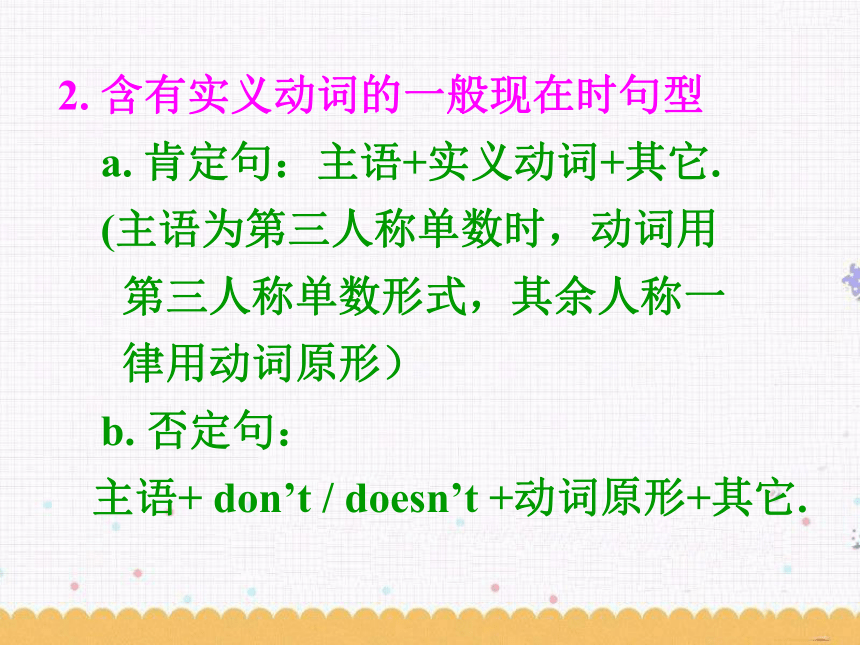
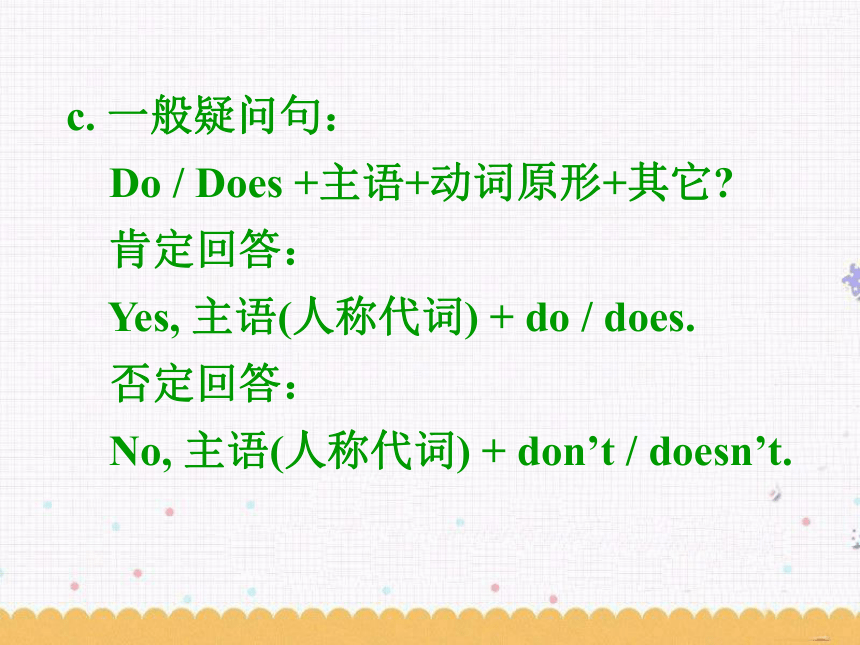
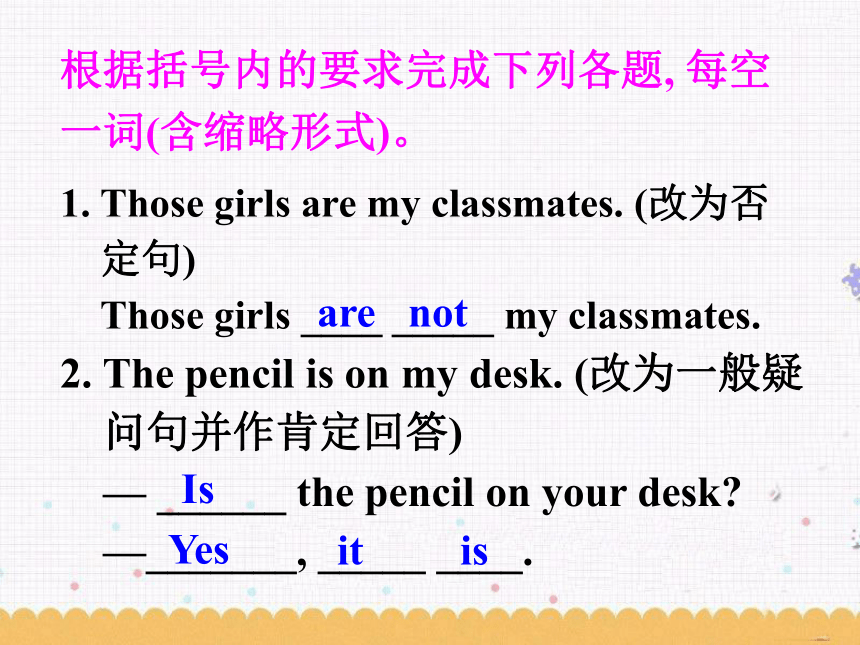
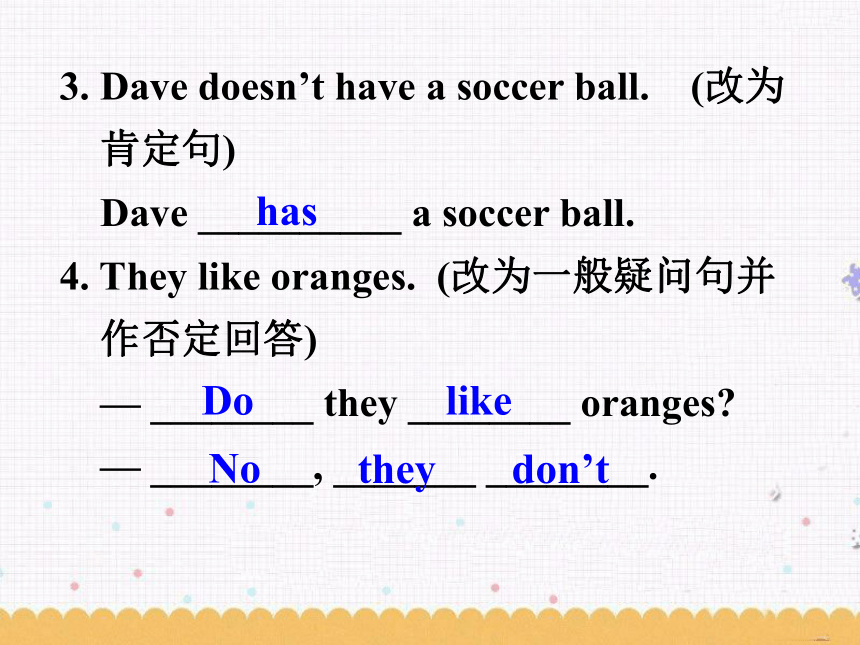
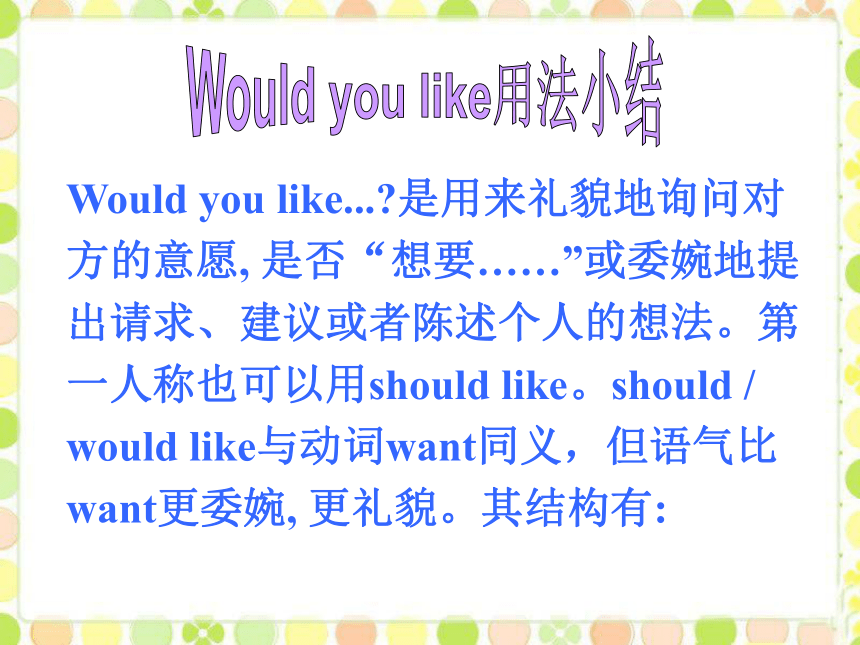
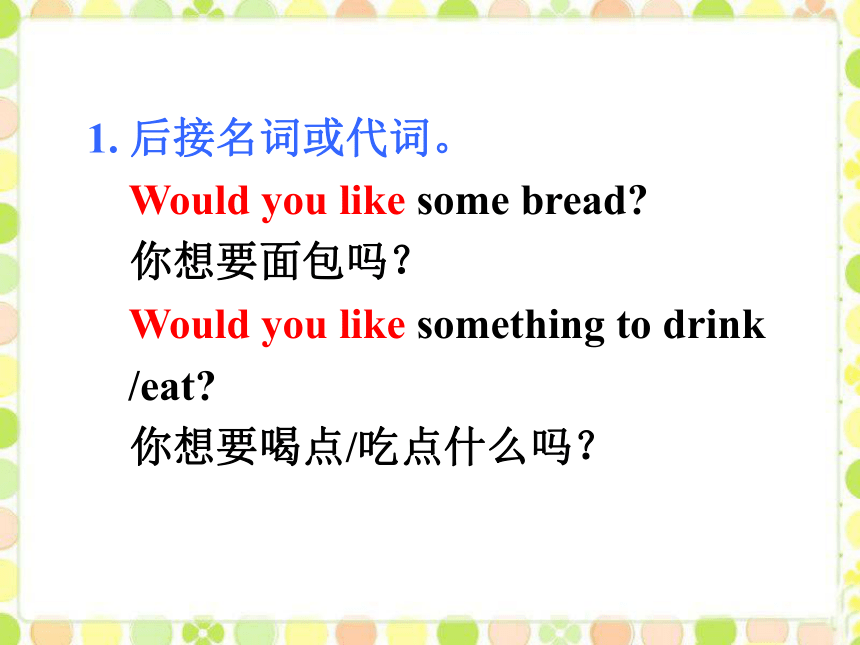
文档简介
(共27张PPT)
Unit4 Topic2 Would you like to cook with us
1. 含有be动词的一般现在时句型
a. 肯定句:
主语+be(am / is / are) +其它.
b. 否定句:
主语+be (am / is / are) + not +其它.
c. 一般疑问句:
Be (Am / Is / Are) +主语+其它
肯定回答:
Yes, 主语(人称代词) + be (am/is/ are).
否定回答:
No, 主语(人称代词) + be (am/is/are) + not.
2. 含有实义动词的一般现在时句型
a. 肯定句:主语+实义动词+其它.
(主语为第三人称单数时,动词用
第三人称单数形式,其余人称一
律用动词原形)
b. 否定句:
主语+ don’t / doesn’t +动词原形+其它.
c. 一般疑问句:
Do / Does +主语+动词原形+其它
肯定回答:
Yes, 主语(人称代词) + do / does.
否定回答:
No, 主语(人称代词) + don’t / doesn’t.
1. Those girls are my classmates. (改为否
定句)
Those girls ____ _____ my classmates.
2. The pencil is on my desk. (改为一般疑
问句并作肯定回答)
— ______ the pencil on your desk
—_______, _____ ____.
are not
根据括号内的要求完成下列各题, 每空一词(含缩略形式)。
Is
Yes
it is
3. Dave doesn’t have a soccer ball. (改为
肯定句)
Dave __________ a soccer ball.
4. They like oranges. (改为一般疑问句并
作否定回答)
— ________ they ________ oranges
— ________, _______ ________.
has
Do
like
No
they don’t
Would you like... 是用来礼貌地询问对方的意愿, 是否“想要……”或委婉地提出请求、建议或者陈述个人的想法。第一人称也可以用should like。should / would like与动词want同义,但语气比want更委婉, 更礼貌。其结构有:
1. 后接名词或代词。
Would you like some bread
你想要面包吗?
Would you like something to drink /eat
你想要喝点/吃点什么吗?
2. 后接不定式,表示想要做某事。
Would you like to go with me
你想和我一起去吗?
3. 后接不定式复合结构,表示想要某人做某事。
Would you like him to do the work 你想要他去做这项工作吗
如果你问别人要什么就用一般疑问句的句型“Would you like... ”或特殊疑问句的句型“What would you like... ”。
对于一般疑问句的肯定回答可以说“Yes, please.”, 否定回答可以说“No, thanks.”
对于特殊疑问句的回答可以直接说出想要的东西,即: I’d like...。
e.g.
A) —Would you like another cup of tea
你还要一杯茶吗?
—No, thanks. / Yes, please.
不,谢谢。/ 是的, 请来些吧。
B) —Would you like to go out for walk
你喜欢出去散步吗?
—Yes, I’d like to.
好吧, 很高兴去。
C) —Would you like to have a party
with me this afternoon
今晚你能和我一起去参加一个晚
会吗?
— Sorry, I’m afraid not.
对不起, 我恐怕不能去。
How about 意思是“……怎么样/好吗 ”,在口语中较为常见。about是介词,其后可接名词、代词(宾格) 或v.-ing形式。在多数情况下可以与What about ... 换用。它主要有以下两种用法:
(1) 表示请求或建议。如:
What about helping me with my
English
帮我学习英语可以吗?
How about having some noodles
吃一些面条好吗?
(2) 表示询问。如:
The boys play football. What about
the girls 男生踢球, 女生呢?
My mother is very well. How about
your mother
我母亲身体很好。你母亲呢?
Work in pairs to make up new dialogues, using the two sentence patterns “would you like to” and “how about/ what about”. You may make up your dialogues according to the following example.
Hi, B!
Hi, A!
B: That’s a great idea!/OK!/Sure!/I’d love to!
A: Would you like to … / How about ... /
What about…?
play computer games
play basketball
play the guitar
ride a bike
I. 用括号内所给单词的适当形式完成下列各题。
1. What about __________(cook) with me
2. Tom likes __________(eat) bananas very much.
cooking
eating
3. She asks me __________(sing) a song with her.
4. I’d like to go _________(shop) with Tom this afternoon.
5. Tina __________(have) to do her homework every day.
has
to sing
shopping
II. 用适当的介词或副词完成下列各
题。
1. Could you tell me something __________ the girl
2. —Are you free tomorrow, Susan
—Yes. What’s __________
about
up
3. Hello, may I speak ___ Jerry
4. Mary isn’t ________ now. She is at school.
5. Would you like to go out ________ a picnic
6. I will take some apples __________ me.
with
to
in
for
III. 根据括号内的要求完成下列各
题,每空一词(含缩略形式)。
1. Jack wants to take some water. (改为否定句)
Jack _______ _____ to take ____ water.
2. I want to see the animals in the zoo. (对划线部分提问)
______ ____ you _____ to see the animals
Where do want
doesn’t want any
3. Jenny often goes shopping with her mother. (对划线部分提问)
__________ __________ Jenny often __________ shopping with
4. Sorry, Mary is out now. (改为同义句)
Sorry, Mary ______ ______ now.
Who does
isn’t in
go
5. Is Tina free this morning (改为同义句)
_________ Tina have _________ this morning
6. How about drinking some milk (改为同义句)
________ _______ drink some milk
Why not
Does time
Unit4 Topic2 Would you like to cook with us
1. 含有be动词的一般现在时句型
a. 肯定句:
主语+be(am / is / are) +其它.
b. 否定句:
主语+be (am / is / are) + not +其它.
c. 一般疑问句:
Be (Am / Is / Are) +主语+其它
肯定回答:
Yes, 主语(人称代词) + be (am/is/ are).
否定回答:
No, 主语(人称代词) + be (am/is/are) + not.
2. 含有实义动词的一般现在时句型
a. 肯定句:主语+实义动词+其它.
(主语为第三人称单数时,动词用
第三人称单数形式,其余人称一
律用动词原形)
b. 否定句:
主语+ don’t / doesn’t +动词原形+其它.
c. 一般疑问句:
Do / Does +主语+动词原形+其它
肯定回答:
Yes, 主语(人称代词) + do / does.
否定回答:
No, 主语(人称代词) + don’t / doesn’t.
1. Those girls are my classmates. (改为否
定句)
Those girls ____ _____ my classmates.
2. The pencil is on my desk. (改为一般疑
问句并作肯定回答)
— ______ the pencil on your desk
—_______, _____ ____.
are not
根据括号内的要求完成下列各题, 每空一词(含缩略形式)。
Is
Yes
it is
3. Dave doesn’t have a soccer ball. (改为
肯定句)
Dave __________ a soccer ball.
4. They like oranges. (改为一般疑问句并
作否定回答)
— ________ they ________ oranges
— ________, _______ ________.
has
Do
like
No
they don’t
Would you like... 是用来礼貌地询问对方的意愿, 是否“想要……”或委婉地提出请求、建议或者陈述个人的想法。第一人称也可以用should like。should / would like与动词want同义,但语气比want更委婉, 更礼貌。其结构有:
1. 后接名词或代词。
Would you like some bread
你想要面包吗?
Would you like something to drink /eat
你想要喝点/吃点什么吗?
2. 后接不定式,表示想要做某事。
Would you like to go with me
你想和我一起去吗?
3. 后接不定式复合结构,表示想要某人做某事。
Would you like him to do the work 你想要他去做这项工作吗
如果你问别人要什么就用一般疑问句的句型“Would you like... ”或特殊疑问句的句型“What would you like... ”。
对于一般疑问句的肯定回答可以说“Yes, please.”, 否定回答可以说“No, thanks.”
对于特殊疑问句的回答可以直接说出想要的东西,即: I’d like...。
e.g.
A) —Would you like another cup of tea
你还要一杯茶吗?
—No, thanks. / Yes, please.
不,谢谢。/ 是的, 请来些吧。
B) —Would you like to go out for walk
你喜欢出去散步吗?
—Yes, I’d like to.
好吧, 很高兴去。
C) —Would you like to have a party
with me this afternoon
今晚你能和我一起去参加一个晚
会吗?
— Sorry, I’m afraid not.
对不起, 我恐怕不能去。
How about 意思是“……怎么样/好吗 ”,在口语中较为常见。about是介词,其后可接名词、代词(宾格) 或v.-ing形式。在多数情况下可以与What about ... 换用。它主要有以下两种用法:
(1) 表示请求或建议。如:
What about helping me with my
English
帮我学习英语可以吗?
How about having some noodles
吃一些面条好吗?
(2) 表示询问。如:
The boys play football. What about
the girls 男生踢球, 女生呢?
My mother is very well. How about
your mother
我母亲身体很好。你母亲呢?
Work in pairs to make up new dialogues, using the two sentence patterns “would you like to” and “how about/ what about”. You may make up your dialogues according to the following example.
Hi, B!
Hi, A!
B: That’s a great idea!/OK!/Sure!/I’d love to!
A: Would you like to … / How about ... /
What about…?
play computer games
play basketball
play the guitar
ride a bike
I. 用括号内所给单词的适当形式完成下列各题。
1. What about __________(cook) with me
2. Tom likes __________(eat) bananas very much.
cooking
eating
3. She asks me __________(sing) a song with her.
4. I’d like to go _________(shop) with Tom this afternoon.
5. Tina __________(have) to do her homework every day.
has
to sing
shopping
II. 用适当的介词或副词完成下列各
题。
1. Could you tell me something __________ the girl
2. —Are you free tomorrow, Susan
—Yes. What’s __________
about
up
3. Hello, may I speak ___ Jerry
4. Mary isn’t ________ now. She is at school.
5. Would you like to go out ________ a picnic
6. I will take some apples __________ me.
with
to
in
for
III. 根据括号内的要求完成下列各
题,每空一词(含缩略形式)。
1. Jack wants to take some water. (改为否定句)
Jack _______ _____ to take ____ water.
2. I want to see the animals in the zoo. (对划线部分提问)
______ ____ you _____ to see the animals
Where do want
doesn’t want any
3. Jenny often goes shopping with her mother. (对划线部分提问)
__________ __________ Jenny often __________ shopping with
4. Sorry, Mary is out now. (改为同义句)
Sorry, Mary ______ ______ now.
Who does
isn’t in
go
5. Is Tina free this morning (改为同义句)
_________ Tina have _________ this morning
6. How about drinking some milk (改为同义句)
________ _______ drink some milk
Why not
Does time
同课章节目录
- Unit 1 Making new friends
- Topic 1 Welcome to China!
- Topic 2 Where are you from?
- Topic 3 How old are you?
- Unit 2 Looking different
- Topic 1 I have a small nose
- Topic 2 What does she look like?
- Topic 3 Whose jacket is this?
- Unit 3 Getting togethe
- Topic 1 Does he speak Chinese?
- Topic 2 What do your parents do?
- Topic 3 What would you like to drink?
- Unit 4 Having fun
- Topic 1 What can I do for you?
- Topic 2 Would you like to cook with us?
- Topic 3 What time is it now?
